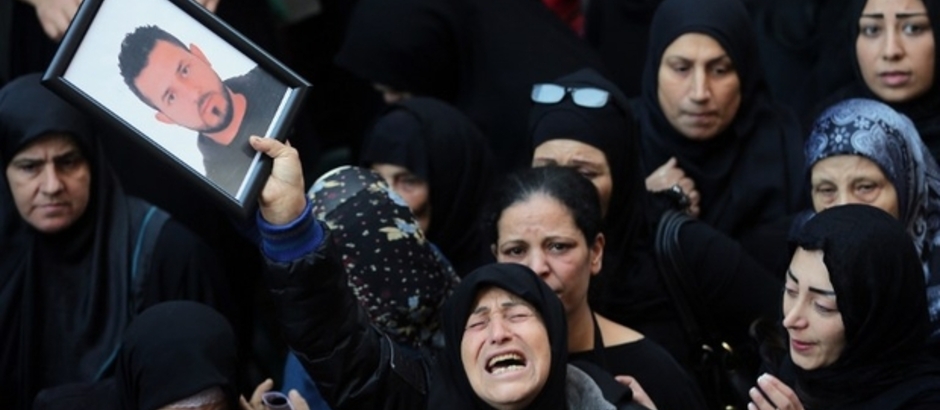Palestinians: Yet another victim of IS in Lebanon

One day before the terrible events in Paris, the Islamic State group (IS) launched an attack in Bourj al-Brajneh, a Shia area of southern Beirut. It was one of the deadliest since the end of the Lebanese civil war, with 44 killed and 239 injured.
Several hours after the attack, IS named the suicide bombers as Palestinians called Hamid Rachid al-Balagh and Omar Selim al-Rais and a Syrian, Khaled Ahmed al-Khalid.
The attack on 12 November, and the ensuing IS claim, sparked accusations against Palestinian communities in Lebanon. Bourj al-Brajneh borders a Palestinian refugee camp with the same name which is home to 20,000 people.
However, two days later the leader of Hezbollah, Hassan Nasrallah, denied the IS claim, saying on al-Manar that no perpetrator of the attack was Palestinian and all those arrested in connection were either Syrian or Lebanese.
“Even if there were Palestinians involved … there is not, for any of us, any religious, political or moral justification for holding the Palestinian people or camps responsible for this crime."
Palestinian political parties publicly denounced the attack. The Palestinian Authority, Fatah in Lebanon and other Palestinian groups issued a joint statement condemning the “odious act".
On 16 November, Sobhi Abu Arab, the Palestinian national security director in Lebanon, stated that "the purpose of these attacks was to spread disagreement between the Palestinians and Lebanese” – an attempt he said had been thwarted thanks to close ties.
Hamas, meanwhile, expressed solidarity with its "Lebanese brothers”, and both Ismael Haniyeh and Khaled Meshaal gave their condolences.
Nasrallah issued his thanks – an extraordinary exchange given Hezbollah and Hamas’s disagreements since February 2012 on the issue of Syria.
The IS attacks have not only given Lebanon a surge of national feeling, they have also, perhaps temporarily, brought together antagonists on a regional scale.
The two Bourj al-Brajnehs
The choice of attack location is interesting for several reasons. IS wanted mass casualties, attacking a civilian area in the evening as residents gathered in the street.
IS wanted to show that the southern suburb was not a fortress and the barricades put in place by Hezbollah following the attacks in 2012 and 2013, were no guarantee of safety.
Its mainly Shia population was an obvious target for a Salafist group that trades on and celebrates sectarian violence.
The attack could also be seen as a response to recent IS losses in Syria - on 10 November, Hezbollah helped dislodge IS from the military airport in Kweiris near Aleppo.
But this does not belie the true nature of the area.
Bourj al-Brajneh is managed by Hezbollah - its mayor, Zohair Jalloul, is a member - but it is not a fiefdom of Hezbollah. It does indeed lie within the area heavily bombed by Israel during the 2006 war. However the Amal movement - directed by the president of the Lebanese parliament, Nabih Berri - remains popular in the area.
Relations between the "two Bourj al-Brajneh", Palestinian and Lebanese, have never been easy: between 1985 and 1987, the camp was often targeted by Amal militia as part of the "war of the camps". But Sunni Palestinian and Shia Lebanese families today often rub shoulders and live their lives alongside one another.
Still, this is perhaps why IS considered it a weak link for Hezbollah. IS wants to make Hezbollah pay for its involvement in Syria, but it also wants to spark tensions between Sunni and Shia people. Using such divisions is obvious logic.
The gamble of the Islamic State
However, it cannot work fully. The full spectrum of Palestinian political groups oppose IS. Hamas for instance went head to head with IS in the streets of the refugee camps in Yarmouk, Syria, in April 2015, while the supporters of Abu Bakr al-Baghdadi in the Gaza Strip officially declared war on Hamas in July.
Political disagreement over Syria has not prevented Hezbollah from maintaining close security cooperation with Hamas. Notably, at the end of the Israeli war in the summer of 2014 against the Gaza Strip, the armed branch of Hamas, the Qassam Brigades, officially thanked Hezbollah for its help, both political and military.
Hezbollah, while fighting for Assad, also maintains ties with both Lebanese and Palestinian Sunnis. It maintains a national dialogue with the Movement of the Future of Saad Hariri, and has security cooperation between the Interior Security Forces, known as being historically close to the March 14 Alliance, and the security bodies such as the Lebanese General Security Forces and the Army Intelligence Services.
Hezbollah also maintains ties with the Lebanese Muslim Brotherhood, Jamaa Islamiya, despite their opposing views on Syria. This summer, during the month of Ramadan, a dinner organised by the Iranian army in the southern suburb invited members of Hezbollah, Hamas and Jamaa Islamiya.
The fear, however, is that the Palestinian population of refugees in Lebanon, many of whom are socially marginalised and precarious, respond to IS as it plays on the sectarian aspects of the conflicts in the Middle East. From this point of view, IS would surely not be the first Salafist group to set up in the Palestinian refugee camps.
Between a certain affinity with Hezbollah, in the framework of the Israeli-Arabic conflict, and a Sunni sensitivity exacerbated by the effects of the Syrian crisis in Lebanon, the Palestinian refugees are called upon by the Islamic State to choose sides.
- Nicolas Dot-Pouillard is an associate researcher at the French Institute in the Middle East (Ifpo, Beirut), and primary researcher for the When Authoritarianism Fails in the Arab World (WAFAW), European Research Council, programme and member of the publication committee of the Orient XXI journal. He is the author of De la théologie à la libération: une histoire du Jihad islamique palestinien (La découverte, 2014), along with Wissam Alhaj and Eugénie Rébillard, and Tunisie: la révolution et ses passés (L’Harmattan/Iremmo, 2013).
The views expressed in this article belong to the author and do not necessarily reflect the editorial policy of Middle East Eye.
Photo: Relatives of a man killed in the attack last Thursday grieve during a collective funeral (AFP)
New MEE newsletter: Jerusalem Dispatch
Sign up to get the latest insights and analysis on Israel-Palestine, alongside Turkey Unpacked and other MEE newsletters
Middle East Eye delivers independent and unrivalled coverage and analysis of the Middle East, North Africa and beyond. To learn more about republishing this content and the associated fees, please fill out this form. More about MEE can be found here.


